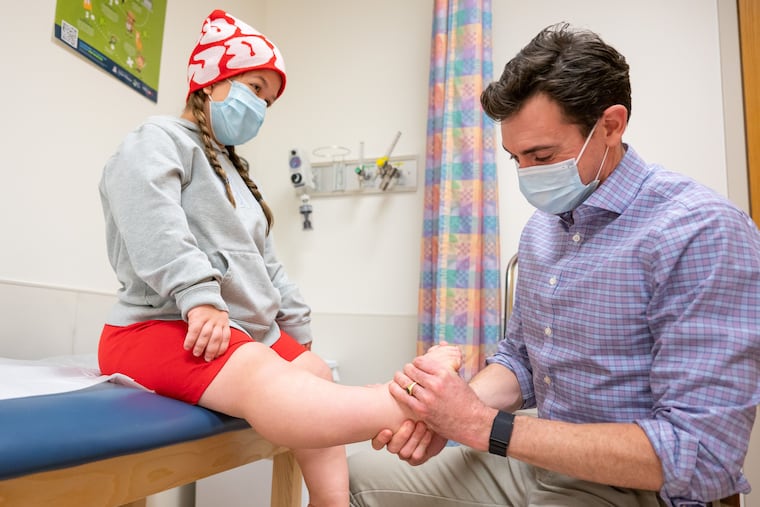Doctor known for treating kids with dwarfism at Nemours retires and passes baton to his son
World-renowned pediatric orthopedic surgeon retires; his son takes over at Nemours.

Fifteen-year-old Izabella “Bella” Bockius said she’s “never not known” William G. Mackenzie, the orthopedic surgeon from Nemours Children’s Hospital who has cared for her since she was 3 months old.
Bella, a high school sophomore from Wilmington, was born with achondroplasia, a form of skeletal dysplasia, or dwarfism, that impairs bone growth. She sees Mackenzie several times a year, and by now, he feels almost like family, she said.
Mackenzie is one of only a handful of orthopedic surgeons worldwide who specializes solely in skeletal dysplasia. In his three-decade-plus career, he’s treated thousands of patients like Bella, from birth up to age 35, and even appeared on TLC’s The Little Couple, a reality show chronicling the life of a couple with dwarfism.
Earlier this month, Mackenzie, 70, retired from Nemours, where he’s provided highly specialized care to children since 1986. Mackenzie said he knew of only one other surgeon like him in the United States.
“That is about as rare as hen’s teeth,” Mackenzie said about his specialty.
That is, until recently.
Mackenzie’s 41-year-old son, W.G. “Stuart” Mackenzie, also an orthopedic surgeon, joined his father at Nemours’s Skeletal Dysplasia Program about four years ago and plans to carry on his father’s work.
Dwarfism is a rare specialty
There are about 400 types of skeletal dysplasia. Achondroplasia, the kind that Bella has, is the most common, affecting about 1 in 25,000 babies each year. The condition is marked by short stature, 4 feet, 10 inches or less, and can leave a person with limbs and a trunk not of the same proportion as average-height individuals. It often causes complications, including bowed legs and spinal cord compression, that require surgical intervention.
If left untreated, skeletal dysplasia can cause wide-ranging medical issues, such as difficulty breathing, fluid buildup around the brain, chronic ear infections, obesity, and narrowing of the spine.
Because there are so few specialists trained to care for people with dwarfism, families routinely travel hundreds of miles to Mackenzie’s Wilmington-based clinic. They come from around the country, including Idaho, Wisconsin and Louisiana. One family cooked crawfish étouffée, a Cajun dish, for the entire skeletal dysplasia team.
Charles Scott, 88, a geneticist who started the skeletal dysplasia clinic at Nemours and retired in 2006, took William Mackenzie on as a mentor in the late 1980s. Scott described Mackenzie as a talented surgeon who excelled at operating on every part of a patient’s body, from neck to foot, with the bedside manner to explain medical terms to kids and their families in a way they could understand and felt comforted with.
Unlike other doctors, said Bella Bockius, Mackenzie talks to her as if she’s an adult. “My mom’s just there in the room and he’s really talking to me and asking me questions.”
Like father, like son — ‘Big Mack’ and ‘Little Mack’
Mackenzie said he started in medicine at a time when no one batted an eye when he took Stuart, the oldest of three sons, to the hospital with him as a boy.
“I spent a lot of early mornings at the hospital on rounds when I was growing up,” Stuart Mackenzie recalled. “And I realized in myself that it was something that I would find very, very fulfilling.”
William Mackenzie said he would have had a hard time leaving the job and his patients — many of whom he’s watched go off to college, start careers and get married — if not for his son.
“I’m retiring because I’m old and decrepit,” he laughed, then turned more serious. “What allowed me to step away is the fact that I’ve got a fabulous group and a fabulous heir behind me.”
When a reporter asked Stuart Mackenzie whether he’s worried about filling his father’s shoes, the older Mackenzie jokingly piped up, “Oh, no one can do that.”
The father-son team has operated together for the last few years. They twice performed surgery on Bella’s back, placing metal rods to straighten her spine and relieve tension so she could walk properly.
“We’ve been calling them ‘Big Mack’ and ‘Little Mack,’” said Bella’s mother, Heather Bockius. The father, who is more no-nonsense, is the “bad cop” to his son’s “good cop” persona, she said.
“The older Mackenzie is very much like, ‘Oh, you need that bandage ripped off? OK, RRIPPP!’ If it was Little Mackenzie, he would be like, ‘OK, let’s gently take it off,’” Heather Bockius said, laughing.
On Feb. 8, Stuart Mackenzie operated on her daughter’s ankles to help straighten her legs, which were painfully bowed. “It’s been seamless since Little Mack has come in,” Bella Bockius said. “He’s not even following in his dad’s footsteps, but making his own pathway.”
William Mackenzie, who recently stepped down as chairman of the Medical Advisory Board for Little People of America, a nonprofit dedicated to improving the quality of life for people with dwarfism, said he’s looking forward to spending time with his three grandchildren, golfing, gardening, and fishing for “big fish that run in big rivers.”
“As long as my brain holds up and my body holds up, I think I’ll wake up every day with something to do,” he said.